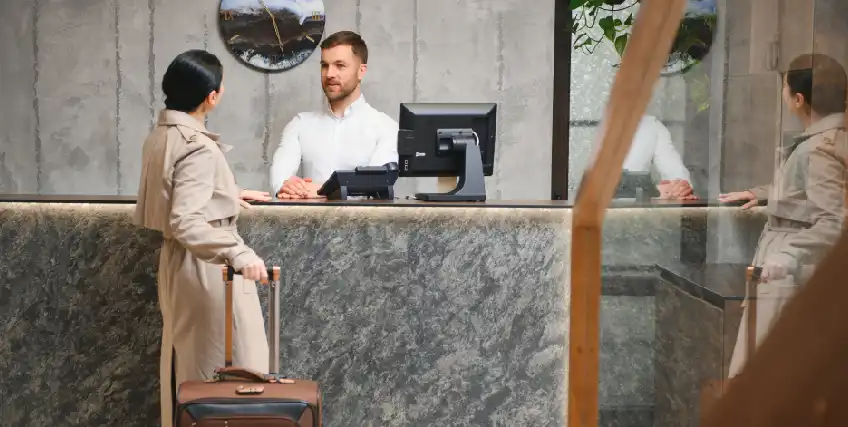Financing the Hospitality Dream: Tips to Buy a Small Business in Hotels, Motels, and B&Bs
September 17, 2025 | Last Updated on: September 17, 2025

There’s something undeniably appealing about owning a cozy bed and breakfast, a roadside motel, or a small boutique hotel tucked away in a tourist-heavy town. But behind that charm is a business. And if you're planning to buy a small business in the hospitality space, you’re stepping into an industry where operational know-how matters just as much as the heart.
Here’s what you need to know about how to buy a small business in the hotel space.
What the Numbers Say About Buying Hotels and B&Bs
Entrepreneurs exploring how to buy a small business in this space need to weigh numbers against lifestyle. While owning a B&B sounds relaxing, the reality often includes 24/7 operations, high guest expectations, and seasonal swings in revenue.
For those who do the homework, hospitality can offer a serious business opportunity. Just remember that a vacation spot to one person may be a full-time job to another.
Red Flags Most First-Time Buyers Miss
Some buyers may rush to buy a small business online without checking the essentials. Location matters, but so does reputation. A property sitting in a tourist-heavy zip code can still struggle with low bookings if online reviews are poor or the current owner didn’t invest in staff training.
Business brokers often suggest starting with the basics, like average monthly cash flow, number of active rooms, revenue per available room (RevPAR), and length of existing staff tenure. These indicators help narrow down whether it’s a growth potential or a renovation trap.
Learning how to buy a small business the right way starts with asking uncomfortable questions. That’s where good deals live. And where bad ones get filtered out.
Smart Ways to Finance a Hospitality Business
Not every deal needs a giant check upfront. Hospitality buyers often stitch together capital from multiple sources. That’s especially true when the business includes both real estate and operations. The good news? Flexible options exist. Some require heavy paperwork, others rely on a seller’s trust, and a few move fast but cost more. It depends on how you plan to buy a small business in this space.
1. SBA 7(a) Loans
SBA 7(a) loan can be an option for many buyers. Backed by the federal government, the 7(a) loan supports business acquisitions, equipment, and working capital. Terms usually stretch 10–25 years with competitive interest.
2. Seller or Owner Financing
Plenty of small business owners, especially in B&Bs or motels, offer this route. You pay part upfront and the rest over time, directly to the current owner. This works well when you buy equity in small business and want the seller to stay involved short-term.
3. Private or Alternative Funding
This category includes online platforms, non-bank financiers, and even peer lenders. Fast decisions short terms and higher costs. It is best for working capital after you buy a small business, like for rehiring staff or rebranding the place.
Before You Sign, Know What You're Really Getting
Finding the right hospitality business is one part of the journey. Structuring the deal is where many buyers go wrong. The way the agreement is written impacts what you're legally taking over, how much you’ll pay over time, and what risks come along for the ride.
Most buyers go for an asset purchase. That means buying only the equipment, furniture, customer list, maybe the brand name but not the legal entity. Safer move. No surprise debts. But sometimes, in a franchise or family-owned hotel, the current owner may push for a stock sale. That transfers everything, including the liabilities.
Business brokers usually suggest reviewing the deal with your attorney and CPA. Line-by-line. That includes terms for owner financing, transition support, and even non-compete clauses.
Watch the purchase price breakdown too. Some sellers inflate the value of real estate or equipment to boost their asking price. Get a third-party valuation done before you agree on anything.
Not every deal will be perfect, but the structure needs to match your goals. Especially when you buy a small business that relies on tight cash flow, high guest turnover, or seasonal demand.
In short, the wrong deal structure can make even the right business a bad investment.
Seasonal Businesses Require Smarter Repayment Structures
Traditional loan structures, like flat monthly payments, rarely make sense here. Not when your best earnings come from summer weekends or holiday rushes. That’s why anyone planning to buy a small business in hospitality must consider seasonal repayment options.
Some commercial lenders and alternative financiers offer interest-only payments for the first few months. Others allow deferred payments during off-seasons. The idea is to keep cash inside the business when it’s needed most and not drain it with fixed obligations. Especially important if you're buying an absentee-run motel and plan to turn it into a full-time service provider model.
What hurts small hospitality owners the most isn't the lack of demand, it’s rigid loan terms that don’t flex with reality. The winter months, for instance, could wipe out a customer base if you’re forced to cut back on service or lay off staff just to stay current on repayments.
If you’re going to buy a small business in this space, structure financing that moves with the rhythm of your market. That’s not a luxury but a requirement.
Due Diligence
Hospitality deals that look perfect on paper often carry hidden issues. Careful review protects buyers from costly surprises. Anyone preparing to buy a small business in this space should slow down and check the details.
1. Zoning and Licenses
Local zoning laws and permits can make or break a hotel or B&B. A property listed on BizBuySell might look appealing, but zoning restrictions could block renovations or expansion.
2. Lease and Property Terms
For those not purchasing real estate, lease agreements matter just as much as the purchase price. Expired or restrictive leases can derail an otherwise existing business opportunity.
3. Staff and Liabilities
Employees form the backbone of guest services. Payroll issues, union disputes, or legal claims need to be reviewed carefully before moving forward to buy a small business in hospitality.
4. Online Reputation
A strong customer base can vanish quickly if negative reviews dominate. Check Google, Yelp, and travel forums, not just financial statements, before assigning any final valuation.
Solid due diligence transforms excitement into clarity, helping entrepreneurs step into ownership with their eyes wide open.
Final Checklist Before You Sign the Deal
Every hospitality acquisition comes with risks. A last review can make the difference between success and regret. Anyone preparing to buy a small business should pause and walk through these essentials:
- Has a thorough due diligence review been completed?
- Do revenue records support consistent cash flow through busy and slow seasons?
- Is the purchase price aligned with an independent valuation?
- Are all licenses, zoning permits, and agreements transferable?
- Did the current owner agree to transition support?
- Is this the right business for your skillset and lifestyle?
- Can the loan repayment schedule be met without draining reserves?
The decision to buy a small business in hospitality is never simple. With this checklist, business owners can move forward with greater clarity and confidence.
You may also like: How Hotel Lending Supports Tourism and Local Economic Growth
Conclusion
Hospitality has always been a people-first industry, but numbers decide who lasts. A dream of running a B&B or motel only works when funding, operations, and expectations align. With the right financing structure and careful planning, anyone looking to buy a small business in this sector can turn vision into reality.
This isn’t just about owning rooms or collecting bookings. It’s about treating an investment like a living, breathing small business that requires strategy and persistence. For entrepreneurs, few paths offer such a rewarding business opportunity when done with focus and patience.
FAQs on How to Buy a Small Business in Hospitality Industry
1. Can I really buy a small business online in hospitality?
Platforms like BizBuySell and BizQuest list motels, hotels, and B&Bs nationwide. Still, careful due diligence is needed before closing.
2. What’s the best way to buy equity in small business in this sector?
Equity deals usually involve partnerships or partial ownership. This works well when the current owner wants to stay involved for a transition period.
3. Do companies that buy small businesses invest in hospitality too?
Many groups target established businesses with strong cash flow and growth potential, especially in popular markets like New York or Los Angeles.
4. How do I know if it’s the right business for me?
Beyond numbers, assess lifestyle fit. Running a motel or B&B often demands long hours, staff management, and direct customer interaction.
5. Is franchise ownership easier than running an independent motel or B&B?
Franchise models provide branding and systems but require fees and less flexibility. Independent small business ownership offers more control but higher operational risk.
Frequent searches leading to this page
Related Articles
Business Continuity Management in the Hotel Industry: Why Access to Capital Determines Survival
December 24, 2025
Term Loans are made by Itria Ventures LLC or Cross River Bank, Member FDIC. This is not a deposit product. California residents: Itria Ventures LLC is licensed by the Department of Financial Protection and Innovation. Loans are made or arranged pursuant to California Financing Law License # 60DBO-35839




